The Abuja-based Connected Development (CODE) has applauded the Niger State Government for assenting to the Water, Sanitation & Hygeine (WASH) Bill which will enhance the autonomy of the State Water Board and establish its independence to deliver safe, clean and potable water to the people of the state.

Governor Abubakar Sani Bello, who signed the WASH bill into law on Wednesday, May 20, 2020, noted that the essence of the water and sewage corporation law is to achieve a developed water system in the state with the establishment of an independent, autonomous and commercially viable utility, according to a statement by the Public Relations Manager of the State Water Board, Aliyu Jibo Garba.
CODE, with the support of the United State Agency for International Development (USAID) Effective Water Sanitation and Hygiene (E-WASH) Services Programme, had urged the state to hasten the assent of the Bill so as to eradicate bottlenecks holding back the need for the State WASH sector to be effective.
CODE had intensified civic advocacy and met with opinion leaders including the Emir of Minna in Niger State, Umaru Bahago, and the Commissioner for Water Resources, Yusuf Suleiman, who had pledged to accelerate the passage of the bill so that the Governor could assent to it.
The new law will also ensure that the water rights of residents are enhanced.
According to the CODE’s Niger State Lead on USAID E-WASH, Richard Umar, before the bill was signed, Niger State had been making intentional efforts to address sanitation issues, especially in urban areas.
CODE expressed commendations to the community-based organisations, media organisations, the WASH Customer Forums and other WASH groups in Niger State for advocating that the government fulfils its promise to the people.
“This commendable development shows the progress Niger is making to achieve the Sustainable Development Goal 6, which advocates for clean and sustainable water for all. Undoubtedly, increasing access to WASH aids economic development, poverty reduction, education (particularly for girls), health outcomes and many more,” said CODE.
